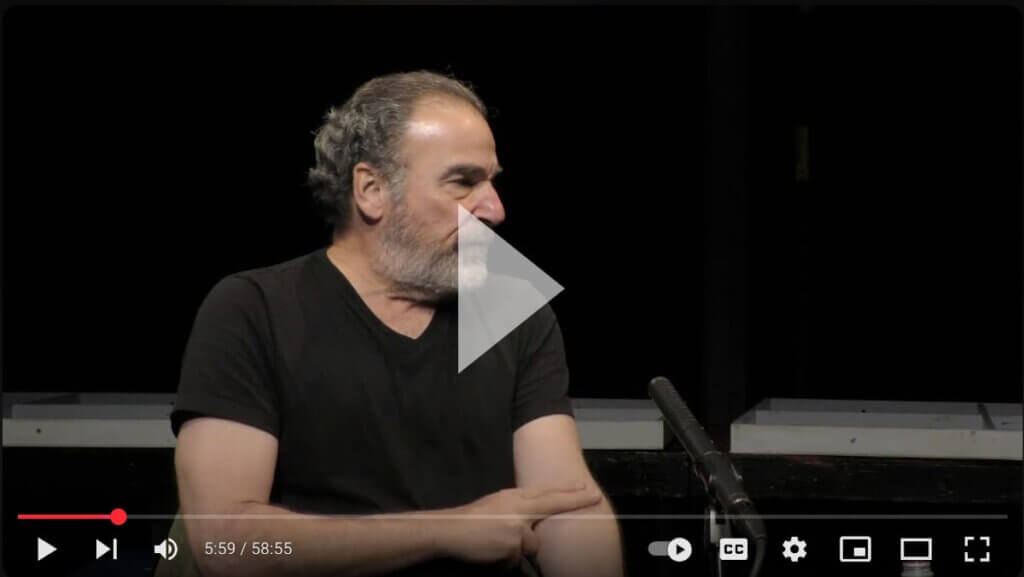Stop fixing things
Last night, discovered an interview with Mandy Patinkin on YouTube. The interviewer posed a question that honestly stopped me in my tracks: “What do you know now that you wish you’d known then?” His answer resonated so powerfully with me, I haven’t been able to stop thinking about it.

Here’s a version of what he said (edited for brevity and clarity). I invite you to consider how it lands for you:
What I know now more than anything has to do with fear, and trying to accept uncomfortableness. Have you ever seen someone nervous and shaking before you and said, “To hell with that person?” No, you lean forward, you breathe out assistance, you encourage with attention with your eyes, and you listen hard.
If there’s one thing I want to leave wishing for the world at large, I wish the world would have the ability to live with discomfort.
There’s this idea of trying to fix everything. I would stop trying to fix everything. Let the mess be there. And so, with this idea of fixing, we’re always trying to fix ourselves. (As he says this he slaps two fingers against the vein on his arm.) Stop it. Just stop it. Don’t fix it with booze. Don’t fix it with drugs. Don’t run away from a job. Don’t run away from a relationship. That’s what I’ve learned at 62 years old.
I wish the world had the ability to live with discomfort.
As I listened, I immediately began to reflect on my own life (you might recognize some of these patterns in your own experience, too). I, too, find myself reaching for a “fix” to avoid discomfort.
- I try to fix every moment of boredom with a quick dopamine hit from my phone.
- I fix an empty feeling with a snack from the pantry.
- I fix a loss of status by showing everyone how smart I am.
- I fix my embarrassment by trying to control other people.
- I fix disappointment by getting angry.
- I fix depression or sadness with a flurry of exercise and activity.
- (I could make this list much longer, but I imagine you get the idea.)
All of those “fixes” have a cost. My control makes people want to avoid me, my puffing up to claim status is off-putting, my anger breaks relationships and trust. I’m undermining myself and compromising my values all the time, simply because I want to experience comfort and avoid pain.
What if I didn’t? What if I chose a different path?
Let the mess be there.
In the interview, Mandy went on to talk about his friends and classmates, Philip Seymour Hoffman and Robin Williams, who had, in the months before this interview, died trying to “fix” themselves with drugs and alcohol. While my own daily “fixes” may not be as immediately life-threatening, the underlying impulse to avoid discomfort feels surprisingly similar. I’m still looking for that “fix,” aren’t I? And perhaps you are too.
Later in the interview, Mandy offered another profound insight:
I don’t wish to have anything that I’ve struggled with taken away from me. I don’t wish to go back and do it over, so I didn’t make that mistake. I thank God for those mistakes. Those mistakes were the glorious moments of my life. The painful, horrifying times, because they made me who, whatever I am, better or worse, right at this second. It’s okay if I’m terrified. It’s okay if I’m jammed. It’s okay because maybe an accident will happen. And that’s when the real glory happens, you know, when it takes off.
This idea, “let the mess be there,” really resonates with me right now. For me, the “fix” costs more than the risk of a mess. It leads me further away from what truly matters and from the genuine connections and discoveries that emerge when I allow myself to stay present with whatever arises. Sometimes the most significant growth comes not from avoiding the struggle, but from leaning into it, even if it feels terrifying.
I’m curious, as you read this, what “fixes” might you be reaching for? What would it look like for you to “let the mess be there” for a little while, and see what possibilities emerge?

Could your leadership range restrain
the growth of your business?
Take our self-leadership assessment to identify opportunities
to grow your leadership (which could grow your business).
Get your results instantly without entering your email address.